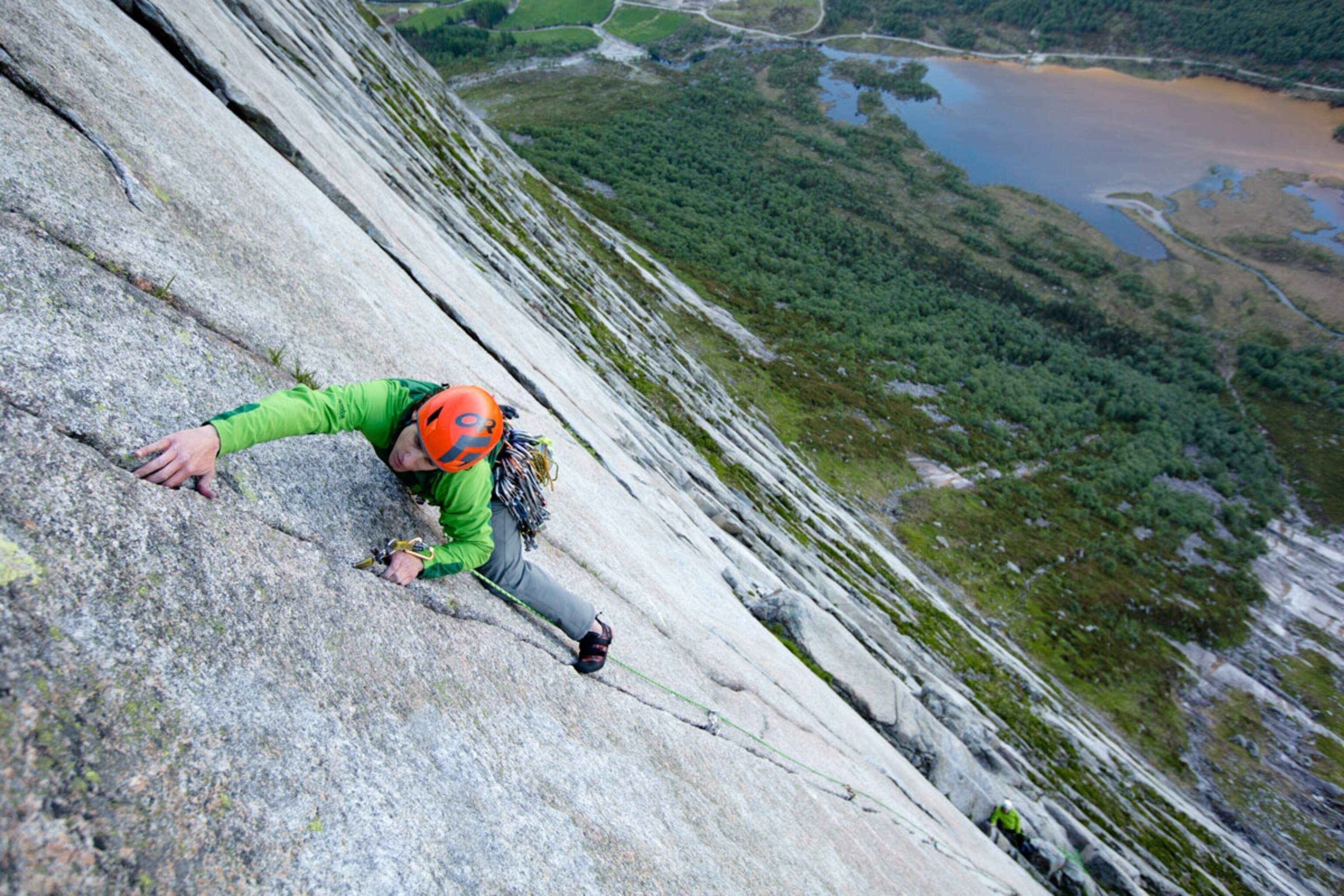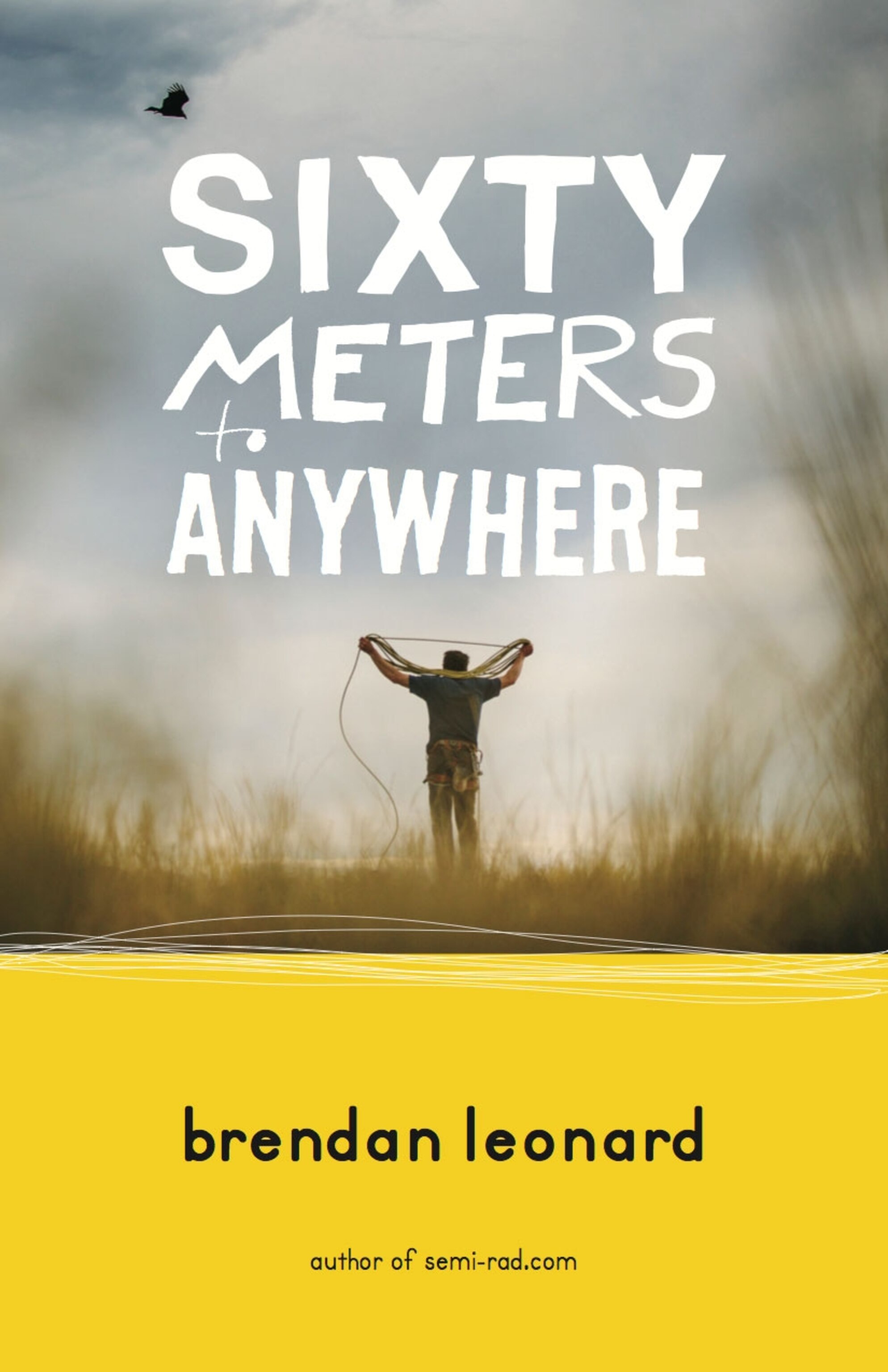
Climbing Out of Addiction
Adventure writer and former addict Brendan Leonard finds other mountains to climb in his new memoir, Sixty Meters to Anywhere.
In what seems like another lifetime, Brendan Leonard sat in the back of a police car in Cedar Falls, Iowa, arrested for his second DUI, and realized he could not afford to mess up again. He had already wrecked several cars and several more relationships, been jumped and beaten bloody, been fired from multiple jobs, and was about to go to jail for the third time. Leonard knew his life was tanking fast.
Leonard served his sentence and moved out west to Missoula, Montana. In the coming years, he endured a painful, awkward period of white-knuckled sobriety, loneliness, and social anxiety. Without drinking, his life had become about what he did not do.
But an unlikely gift, a 60-meter climbing rope, turned his life around. Until that point, climbing was a foreign concept. With his new gift, co-workers from his job at REI introduced Leonard to the basics of climbing. He took it on with hesitation, and usually felt overcome with fear about leading. It wasn’t until he moved to Colorado’s Front Range, three years into sobriety, that he truly fell in love with climbing. Leonard shifted his energy and focus to spending as much time as possible trad-climbing in Boulder Canyon, Eldorado Canyon, and the Flatirons. Through climbing he found freedom and opportunity to become something new.
Today, Leonard is in the middle of a constant stream of creative projects. He is the writer behind the popular blog Semi-Rad. He is a filmmaker, having just premiered "Ace and the Desert Dog" to enthusiastic audiences at 5Point and Mountainfilm. And his second book, Sixty Meters to Anywhere, just hit bookshelves nationwide.
Leonard’s story has become a beautiful, moving tale. His book is heartfelt, and brutally honest. I sat down to discuss with Brendan his journey through sobriety.
Your story in your book connects with people who are not climbers, or who haven’t experienced alcoholism or addiction. Why is that?
I don’t want this book to be something only people with addiction issues get something out of. It’s about the transformative power of the wilderness, which a lot of people have experienced on their own.
Where are you now with your sobriety? Are you still tempted to drink?
I’ve been sober for more than 14 years now. But it’s still something I face daily.
For a long time, my identity was that I couldn’t drink. It’s about what I was not doing. So what am I doing? What am I all about now? Then I started to get outside and climb, spending most of my spare time after work looking through guide books, climbing, and writing about things I did in the outdoors. I basically switched obsessions.
Drinking was so unproductive and unhealthy for me. Now I don’t have enough time to do all the things I want to do! I can’t afford to be knocking out 11 hours in a bar anymore. I have a real drive to get things done, things I feel like I am supposed to do for the world. For me, that’s telling stories and becoming a better storyteller.

You said you switched obsessions. Is climbing and outdoor stuff another addiction? A healthier addiction?
I don’t know if I view it as an addiction. It was a healthy obsession. But no, not addiction. I wouldn’t say climbing wrecked any of my relationships because I was compulsively doing it. It was a thing that replaced this awkwardness about not drinking or doing drugs. Now it’s just become an identity. It’s led to a career telling stories about adventure.
What is it about climbing or the outdoor lifestyle that helped you deal with addiction? Can that same concept work for other people?
I think so. When you’re getting into partying, you’re just focused on having fun. I think the outdoors and adventure is a much more aspirational thing to go after. It gives you goals. Not to sound arrogant, but I needed to become my own hero. And partying was not making me any cooler; I was becoming a loser. Now I travel, climb, trek, and do these things that push me mentally and physically. Hopefully I’m becoming a better person.
You talk about wanting to be a good storyteller. To be a good storyteller you need to live good stories. And sitting around in a bar drinking for most of your life, that’s not living a good story.
There’s a Thoreau quote, “How vain it is to sit down and write when you have not stood up to live!” I think that drives a lot of our outdoor storytelling, and a lot of my life. You can’t just sit down and say, “Here’s what I think.” You have to have something to tell stories about. You do have to get out there if you want to have stories to tell.
In your book you talked about how, after treatment, people need something beyond them. Was there some sort of higher power that worked for you?
In the parlance of AA, you can pick whatever you want as your higher power. I don’t know how comfortable I am with that terminology. Now that I have time to look back on it, basically my higher power was not f****** up again! That was the thing that motivated me. I didn’t want to revisit those low lows. I can’t imagine how hard it would be to battle through a fourth rehab. I’m really just glad I found something that is engaging; to go out and climb mountains, explore the desert, get cold and tired, and have these visceral experiences that people want to have and other people want to make car commercials about.
I don’t really view it as a big spiritual or mystical thing. Thankfully I found climbing, but it could’ve been comic books or starting a band.
Was there a moment or an experience that felt like a revelation? Or was it all slower than that?
There’s a scene in the book on Borah Peak in Idaho, the first mountain I ever climbed. It’s a third-class ridge, easy climbing, but you could fall off either side and die. I didn’t know what I was getting into. I didn’t know what mountain climbing entailed. That’s the moment I was hooked.
But I feel like I’ve had dozens or hundreds of those moments, where you’re halfway up a climb or hanging out on a belay waiting for your friend to lead the next pitch. In that moment, I’ve had that realization that, “I’m doing this. This is my life.” You don’t just magically end up there by accident. You have to go out and find those things and get yourself out there.
To me, your book is about finding your identity, and that you found yours through climbing and the outdoor community. Finding your identity is a universal struggle. Does that resonate with you?
Absolutely. If you do something enough you become that thing. If you climb enough you are a climber. I’m not a particularly good climber, but I do it to the point where it’s part of me; it’s one of my identities. In addition to being a boyfriend, son, writer, bleeding heart, animal lover, and cyclist.
I thought the book was going to be about all the rad things you do. But it wasn’t. It is much more about your struggle, which is a lot more human, relatable, and ultimately more powerful.
A lot of the role models we have in the outdoor industry are people who have their shit together, who are high achievers. And you never really hear the other side, and that isn’t a full story. A lot of us feel like, “Gosh, I’m not that cool, I’m not that together.” None of us is that together.
I asked Grayson Schaffer, an editor of Outside magazine, for a blurb for my book. I sent him my book in advance, he took a week to read it, and emailed me back, “Man, I had no idea how f***** up you were.” Of course we didn’t use that. He ended up writing something much more eloquent.
I had a rough go of it for a few years. And that’s not a story we like to tell.
Is there anything you’d want to say to other people who are battling addiction, or are looking for their identity in a misguided place?
There’s an idea in America that you only have one time in your life where you can do whatever you want, and that’s when you’re young. You graduate and get a copy of the Dr. Seuss book Oh, the Places You’ll Go. And then you set yourself up for the rest of your life.
I have this idea of a “big bang theory of extreme joy” which are disruptive events in life that force you to start over. I’ve had a number of times in my life when I had to start over. Rehab was one of them, five years after the world was supposed to be my oyster. It sucked. But I was able to create a new identity for myself through that.
A lot of things can be that big bang for you. It can be the end of a relationship. It can be somebody really close to you dying. It can be losing a job, moving your stuff into storage and hitting the road for a year, or having a child. All these things that are big life changes where you recreate that feeling of possibility that is really exciting, even if the event is really sad.
I encourage people to think about it that way. If you don’t have that in your life and you are not happy, how can you create that? Are you really going sit around at your job and complain for the next 25 years? Or are you going to do something about it? I hope that that’s what people can take away from my story. You are in charge of your own story to an extent. If you are born in America and read books for pleasure, you can choose a destiny in some respect.